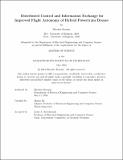Distributed Control and Information Exchange for Improved Flight Autonomy of Hybrid Powertrain Drones
Author(s)
Kosanic, Miroslav
DownloadThesis PDF (1.740Mb)
Advisor
Ilic, Marija
Terms of use
Metadata
Show full item recordAbstract
This work addresses integrating mechanical dynamics and powertrain energy conversion dynamics in Unmanned Aerial Vehicles (UAVs), focusing on hexacopters with hybrid powertrains. The goal is to maximize fuel savings and achieve that through powertrain regulation. One of factors that influence optimal internal combustion engine (ICE) operation is the passively managed battery, which should have the role of a fast supplementary power source. When the powertrain faces disturbances, ICE efficiency may decrease. The question is whether coordinated information exchange through distributed or decentralized control of the battery can outperform centralized powertrain control, which treats the battery as a disturbance in a component-isolated approach. The core contributions of this thesis include developing a novel modeling approach that integrates energy conversion dynamics with the mechanical dynamics of the drone. A second contribution of the thesis estimates parameters of nonlinear dynamics, using flight-mission data, and shows theoretical conditions for which the system exhibits time-scale separation. Using an average-parameter model, a composite Linear Quadratic Regulator (LQR) policy with predictive control was implemented and simulated during the cruise phase of flight phase, achieving 4.5% fuel savings by recognizing battery disturbances. This result from the centralized approach is compared to the thesis’s third contribution, distributed and decentralized control of the battery, where the two differ as decentralized control is achieved through the local information exchange, while distributed components can obtain needed information from components that they are not directly connected. Both approaches enable the increase of supplement power from the battery, reducing the demand impact on the generator and ICE and saving fuel. The distributed control is helping aggressively without proper coordination, ending up as non-cooperative control, as it doesn’t have information on what is the power that the generator needs. Decentralized approach receives the information of supplement power, and as coordination is embedded in this information coming from the generator, and achieves cooperative control. For the fully charged battery during the cruise phase of the flight, distributed saved approximately 34.56% of the initial fuel, while decentralized control saved 50.05% of the initial fuel in the reservoir.
Date issued
2024-05Department
Massachusetts Institute of Technology. Department of Electrical Engineering and Computer SciencePublisher
Massachusetts Institute of Technology